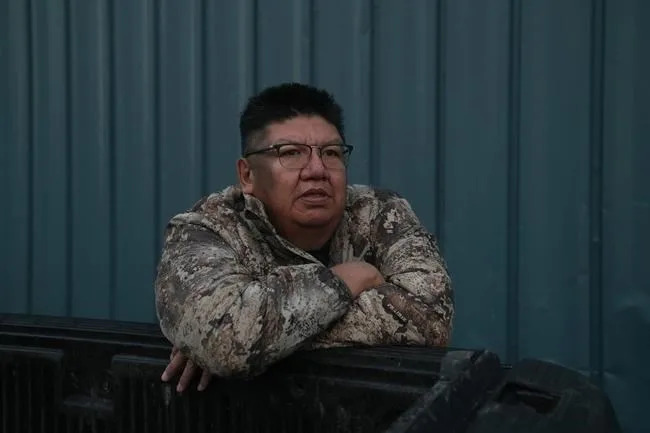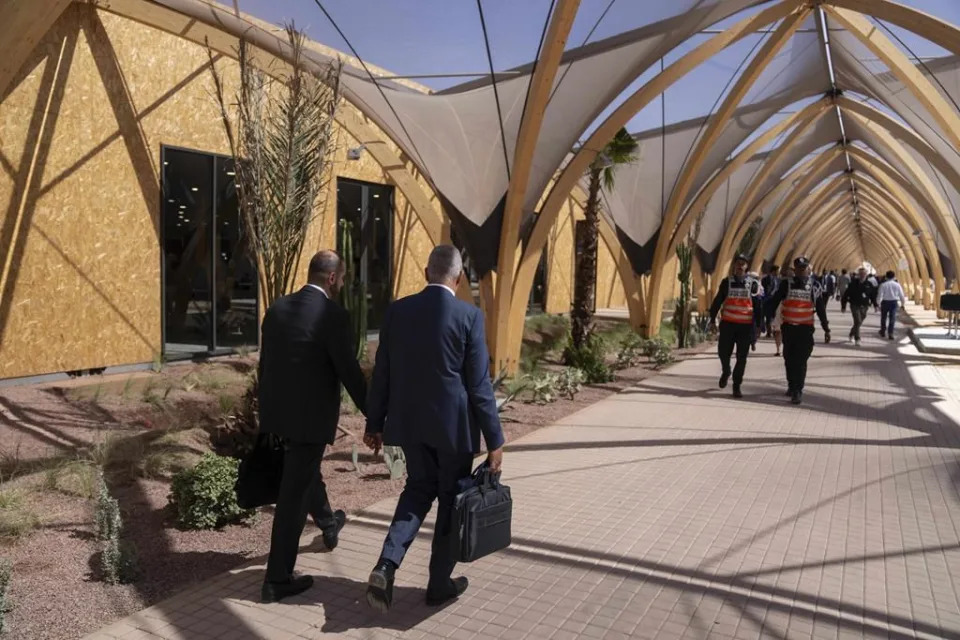The Canadian Press
Tue, October 10, 2023

NESKANTAGA FIRST NATION, ONT. — On the shores of Attawapiskat Lake, deep in the Ring of Fire region in northern Ontario, sits Neskantaga First Nation – a community of about 350 people that can only be accessed by plane or an ice road in the winter.
Many residents, who have for years dealt with challenges including a longstanding boil-water advisory and a shortage of adequate housing, are concerned that Ontario's desire to mine metals from the Ring of Fire could threaten Neskantaga's way of life.
The First Nation's chief, Chris Moonias, wants to meet with Premier Doug Ford to discuss his community's concerns, although that has not happened. From his office in Neskantaga, where a large, orange Every Child Matters flag with his First Nation's insignia hangs on a wall, Moonias sits down with The Canadian Press to share his thoughts.
What is Neskantaga’s position on the proposal to mine the Ring of Fire?
Neskantaga is a pro-development community. We're not saying right out no. We just want to be part of it. We want to have jurisdiction into the area and before anything happens in our territory, in our homeland. We want to be part of the decision making. We have to know what the real benefits are and we have to know what the real impacts are.
Will Neskantaga say yes to mining?
Not at this time because we're not full participants. Everything is being done according to what Ontario wants. Everything was being pushed during the pandemic, this free-entry mining. It's like we don’t have a say at all and that doesn’t sit well with the First Nation.
Do you hope Doug Ford and his government will change their approach?
Not the way they’re acting now. But I hope that some day, maybe the investors will force Doug Ford to act accordingly for a First Nation’s full participation.
What about the promise of prosperity and jobs?
Jobs is a given, it’s easy to get jobs in any development. It’s automatic to get jobs. We’ve had mining in and around northwestern Ontario. You don’t see these First Nations prosper, many boil-water advisories, a lot of poverty. We got to be careful We're always told we'll get jobs, you will get this, you will get that, but nothing happens. That’s why we haven’t been able to really support what’s going on with the Ring of Fire. There are promises of prosperity, sure. We’ve been promised that many times before. It's the rich getting richer. Once they’ve extracted the resources, we’re still out there with boil-water advisories, we’re still in a housing crisis, we’re still in a social crisis. It doesn’t benefit communities as of right now.
— This conversation has been edited and condensed.
This report by The Canadian Press was first published Oct. 10, 2023.
Liam Casey, The Canadian Press
'We want to be able to decide': Inside the battle over the Ring of Fire
The Canadian Press
Tue, October 10, 2023
NESKANTAGA FIRST NATION, ONT. — On a rock-covered beach in the heart of the Ring of Fire in northern Ontario, Alex Moonias gazes east, then north. All he sees is undisturbed land, water and air.
Some 100kilometres from where he stands, the province plans to build a road as part of its pledge to mine the area, which is said to be rich in metals needed for electric vehicle batteries.
Moonias, an elder from Neskantaga First Nation, and many in his community see the provincial government's ambitions for the Ring of Fire as an existential threat to their way of life.
"Mother Earth is hurting," the 70-year-old says. "If a big needle is pushing into your body, how would you feel?"
The survivor of a residential school and, later, alcohol addiction, has heard government promises of prosperity related to developing the territory before. And he's not convinced.
"The government has to come and see the land, or at least spend time with us," he says, breathing in the morning air as water laps the rocky shoreline. "The gift the Creator gave us is to protect the land."
Neskantaga's leadership is not completely opposed to mining in the Ring of Fire, a 5,000-square-kilometre area about 500 kilometres northeast of Thunder Bay, Ont. But they are dead set against the way the province has gone about it, saying the government has not properly involved them.
"We're not saying outright no, we just want to be part of it," Chief Chris Moonias says.
"Before anything happens, we want to be able to decide. We have to know what the real benefits are and we have to know what the real impacts are."
Premier Doug Ford has made mining the Ring of Fire a key priority as part of his goal to build an end-to-end electric vehicle manufacturing chain in Ontario.
The province and federal government have together committed billions to deals inked with auto giants Volkswagen and Stellantis to build EV battery plants in southern Ontario. In Ford's vision, the metals supplying those plants would come from northern Ontario and head south for refining and processing.
The province considers nine First Nations to be within the Ring of Fire.
Two of those First Nations – Webequie and Marten Falls – are leading an environmental assessment on a proposed road to the Ring of Fire. While other First Nations say they respect Webequie and Marten Falls' position, they also say the province is employing what they call a colonial divide-and-conquer tactic.
In Neskantaga, Chief Moonias says the premier has yet to reach out directly to the community to discuss plans for the Ring of Fire. Government promises of prosperity ring hollow, he says.
Neskantaga has been under a boil-water advisory for more than 28 years – the longest continuous boil-water advisory in the country, which only the community’s leadership decides when to lift. There's also a housing crisis — the fly-in community of about 350 people needs at least 100 more houses and many live in cramped conditions.
The community has no high school, meaning children have to leave at 13 or 14 years old for education. There is no doctor in the community and its nursing station faces constant staffing shortages.
A state of emergency declared in 2013 over a rash of suicides remains in place. Opioids are an emerging worry, while alcohol still finds its way inside the dry reserve.
Prosperity, the chief says, would have to come in the form of tangible improvements.
It means a high school in the community, he says. It means clean drinking water, good jobs, a paved airport runway that would allow bigger planes in and better access to doctors and nurses.
COMMUNITY CONCERNS
Outside a home for elders, George Sakanee fiddles with a new metal detector. He loves hunting for metallic rocks. Out of one pocket comes a few stones. He pulls a magnet out of his other pocket. A shiny black rock gets pulled to the magnet.
"There's a lot of metal around here," he says with a smile.
He recounts a story about another elder who performed a ceremony that connected him to the spiritual world deep inside the Ring of Fire.
"The Ring of Fire is a gift from the Creator to the Indian people," he says the elder told him.
"But Doug Ford wants all of it now and what will we be left with?"
An all-weather road to a mining development, if it's ever built, also presents concerns. There are plans for several water crossings, including a bridge over the Attawapiskat River.
"They will contaminate the water and we could lose a lot of our fish," says Ryan Moonias, who lives in Thunder Bay with his young family but returned to Neskantaga for its annual summer festival.
"I worked in a mine before, I know what can be left behind, sometimes they screw up, or there are accidents and spills. It could mess up our environment, screw up our hunting grounds and trap lines."
For Roy Moonias, the road itself is an issue.
"Who owns that road? Will there be Ontario police on that road? What else comes with that road, more drugs and alcohol?" he says.
"Building a road into our territory will cause changes and we're obviously really worried about that."
MARTEN FALLS
About 150 kilometres southeast lies Marten Falls First Nation, which is taking a different approach.
It is working on two possible road projects. One is an access road that will connect it with the provincial highway system to the south. The First Nation is leading an environmental assessment that should be complete in two years, says Chief Bruce Achneepineskum.
"That access road would provide for better lives in our community because we would have 24-hour transportation to another community for health reasons, or for education, employment and training, and the list goes on," he says.
The second project is the so-called "Northern Road Link" that would lead to a proposed Ring of Fire mining site known as Eagle's Nest, owned by Wyloo, an Australian-based mining giant controlled by billionaire Andrew Forrest.
Marten Falls and Webequie First Nation are leading the road's required provincial environmental assessment, which Achneepineskum says will not be complete until 2026.
He emphasizes that helping lead the environmental assessment is not a tacit approval to mine the region.
"We felt strongly that we should take the lead in any development happening in our territory," Achneepineskum says.
"But first we want to address the social conditions and economic conditions in our community. These issues are being ignored."
Marten Falls has been under a boil-water advisory for 17 years, so fixing the water problems is paramount, the chief says. The community also needs more housing and better health care.
Marten Falls hopes the proposed road to the provincial highway system will help address those issues, the chief says. The road to the Ring of Fire comes a distant second in priority, he says.
The chief feels, however, that Marten Falls is being held back by other First Nations who disagree with his community's approach.
"This is a new form of paternalism, but now it seems to be coming from our Indigenous brothers and sisters," he says. "Do we have to give up our vision because we have not agreed to a collective approach?"
THE GOVERNMENT VIEW
On a recent afternoon, three Ontario ministers were ebullient when discussing the creation of an end-to-end electric vehicle battery manufacturing chain.
The province is coming off two big — and expensive — wins in service of that goal by landing, with Ottawa, deals with Volkswagen and Stellantis for electric vehicle battery plants in southern Ontario.
Greg Rickford, who runs two ministries — northern development and Indigenous affairs — along with Mining Minister George Pirie and Economic Development Minister Vic Fedeli say all of northern Ontario holds the key to economic growth across the province.
"This is a generational opportunity to transform our economy," Pirie, a former gold mining executive, says.
With development comes a host of jobs, they say, including engineering, architectural, accounting and legal work. There will also be jobs in mines and need for heavy equipment operators, among others.
The ministers believe the development will spur socio-economic change within northern Ontario First Nations. And, of course, be crucial to Ontario's plans to become an EV battery powerhouse.
Rickford, who spends a lot of his time talking to chiefs across northern Ontario including Neskantaga's leader, believes the government can reach agreement with the opposing First Nations.
"We have lots of talks off-line around some of the things that (Neskantaga) needs to move forward," he says. "If we focus on those common interests around legacy infrastructure and keep it keep it pretty simple, we have a clear path."
The province has recommitted $1 billion to develop the Ring of Fire, like the previous Liberal government before it. Ontario has repeatedly asked the federal government to match the funds, which it has thus far not done.
Ottawa wants to develop a domestic source of critical minerals, but it believes many other mining projects across the country are closer to realization.
"We are going to focus very much on expediting the development of Canadian resources," says Energy and Natural Resources Minister Jonathan Wilkinson.
"We will only develop minerals in a manner that is sustainable and respects the rights of Indigenous peoples."
MINING PROSPECTS
In downtown Toronto, Kristan Straub, the Canada CEO of Wyloo, shows off a model of what the underground area that could be explored at the company's site in the Ring of Fire might look like. The mine would be three times as deep as the CN Tower is tall — possibly deeper.
Wyloo is performing exploratory drilling at its Eagle's Nest site and completing a variety of engineering studies. It has also made a commitment to bury 100 per cent of any mine tailings underground in a process Straub says is safe.
In 2007, nickel, copper and platinum metal deposits were discovered at the site. Nickel is a key component of electric vehicle batteries, accounting for roughly 80 per cent of one, says Straub, who came to the company in the spring.
Eagle's Nest – if and when it becomes operational – could produce upwards of 15,000 tons of nickel annually.
"Our goal today is to be in a position where we're ready for construction in four years by 2027, and that would see us in production for 2030," he says.
Wyloo forecasts a 12-year mine life with a possible eight-year extension, he says.
The majority of nickel currently mined in Ontario is exported, Straub says. With the coming Volkswagen and Stellantis plants, the need for nickel in the province will skyrocket.
"Is Eagle's Nest going to supply Ontario's new battery electric vehicle market?" he says. "No. It's going to take, roughly by our calculations, probably close to 25 to 30 new Eagle's Nests."
For any of that to work, the company needs a road to haul out the metals it extracts. And it needs collaboration with First Nations, he says.
Straub, from Henvey Inlet First Nation south of Sudbury, Ont., understands better than most the needs of Indigenous communities. The company is in direct talks with some First Nations, he says.
Wyloo has pledged at least $100-million worth of contracts for Indigenous companies. They've also established a fund to invest in First Nation communities' priorities, focusing on health care and education.
"Certain First Nations are going to either highlight that they have a problem or they want us to stop," Straub says.
"Our ask back to the government and to the other First Nations is that while we respect your opinion, that we don't get stopped in terms of the exploration work or the engineering work."
Individuals and companies can stake mining claims for a small fee in Ontario. There are more than 28,000 mining claims held by 14 companies and individuals in the Ring of Fire, the province said.
Last week, several First Nation leaders, including Neskantaga's chief, protested Ontario's Ring of Fire plans at the legislature. Four First Nations outside the Ring of Fire have pledged to support Neskantaga in a group they've called the Land Defence Alliance.
Chief Rudy Turtle of Grassy Narrows First Nation, which is part of the alliance, does not want mining, logging or any development in his territory — or in any others.
In the 1960s and '70s, two paper mills dumped thousands of kilograms of mercury into a river upstream of Grassy Narrows.
Researchers have reported that more than 90 per cent of the residents in Grassy Narrows and the Wabaseemoong First Nation show signs of mercury poisoning, including Turtle. He lives with seizures, the shakes and co-ordination problems.
"What I'm seeing is it's nothing more than a divide-and-conquer tactic," Turtle says. "It's led to tragedy in the past, and that's how I see it right now."
— with files from Mia Rabson in Ottawa.
This report by The Canadian Press was first published Oct. 10, 2023.
Liam Casey, The Canadian Press














